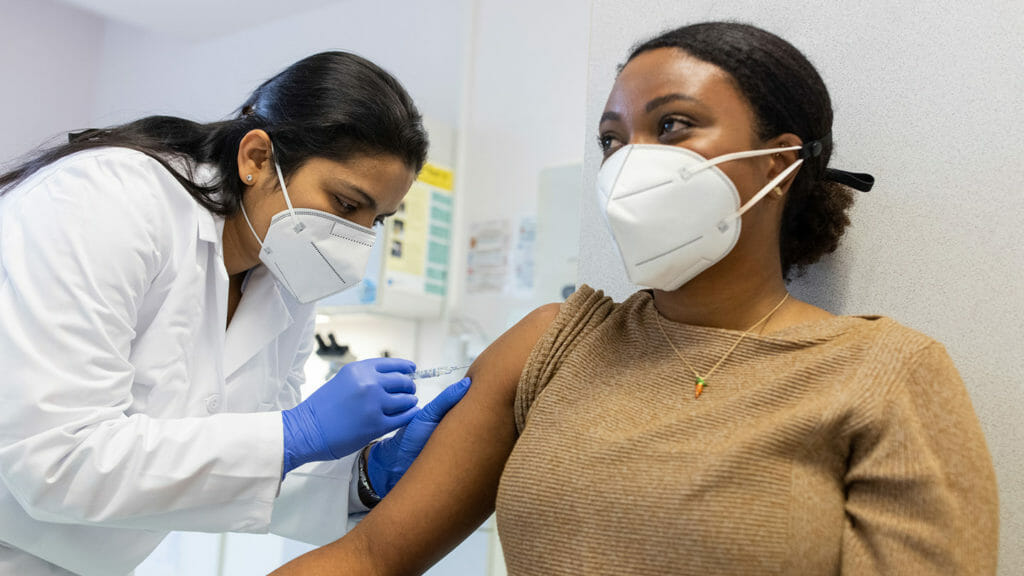
The Centers for Medicare & Medicaid Services will not be enforcing its rule requiring healthcare workers at Medicare- and Medicaid-certified facilities to be vaccinated against COVID-19 while preliminary injunctions against the regulation are in place.
CMS made the announcement in a memo to surveyors on Thursday.
The news comes after federal judges in Louisiana and Missouri granted the temporary injunctions first in 10 states on Monday and then broadly on Tuesday. The second ruling, from the U.S. District Court for the Western District of Louisiana, stopped implementation in all states due to what the judge called “a need for uniformity.”
CMS said it has appealed both decisions and filed motions for stays of both orders.
“While CMS remains confident in its authority to protect the health and safety of patients in facilities certified by the Medicare and Medicaid programs, it has suspended activities related to the implementation and enforcement of this rule pending future developments in the litigation,” the agency wrote.
“Accordingly, while these preliminary injunctions are in effect, surveyors must not survey providers for compliance with the requirements of the interim final rule. Healthcare facilities, of course, may voluntarily choose to comply with the interim final rule,” CMS added.
The regulation requires eligible healthcare workers to be fully vaccinated by Jan. 4, 2022. Its first deadline required workers to have at least one shot by Monday. The rule also allows for medical and religious exemptions and requires providers to have policies and procedures to account for the exemptions.
The nationwide injunction will remain in place until further action is taken by the Louisiana U.S. District court, the Fifth U.S. Circuit Court of Appeals or the U.S. Supreme Court.
It’s hard to say how soon a decision could be reached during the appeals process, according to Kristin Ahr, a partner at Nelson Mullins in its West Palm Beach, FL, office.
“The appellate process can take a week or it can take six months. It just depends how fast people are moving,” Ahr told McKnight’s Long-Term Care News on Thursday. She also called the decision to appeal “a smart move” for the Biden administration and CMS.
“Most legal analysts felt that, out of all the three mandates that came out of the Biden executive orders, the one that had the most legal teeth was the CMS mandate,” Ahr said.
The judge in the Missouri ruling argued that CMS may not have the authority to implement such a mandate without approval from Congress. Ahr argued that CMS has the legal ability to mandate the providers it regulates have all workers vaccinated to ensure the healthcare space and those facilities receiving Medicare and Medicaid dollars are protected.
“Now we’re caught in this political back-and-forth so the losers are pretty much everyone. The healthcare administrators are caught with if [they] don’t implement this vaccine mandate [they] could lose their benefits, existing claims that are being processed with CMS, all of their admissions or terminations from the program. That’s pretty big,” Ahr said.
“That’s too big of a risk to just say, ‘Oh, well there’s a nationwide injunction. We’re good now.’ It’s not all good now. It’s more of a mess than there was before,” she said.
She added that most providers are continuing to voluntarily follow the interim final rule “because that’s the best course of action.”
For healthcare entities in states where there is a state law prohibition on vaccine mandates, it is safest to halt the mandate, according to Sarah Coyne, a partner with Wisconsin-based firm Quarles & Brady.
“For healthcare entities in states where there is a state law mandate for vaccination, it is safest to continue the mandate. For other states (which have neither a mandate nor a prohibition), the states could go either way,” she said. “Our thought is that if you are in one of these states and it did not participate as a plaintiff in either lawsuit, you should continue to press forward with the mandate. That said, numerous systems are deciding to hold on the mandate.”
Coyne added that while it has been very difficult to implement the mandate in an already challenged workforce shortage, it is healthcare entities that are losing time while awaiting a final decision. There’s also “mass confusion among healthcare workers as to what is happening or likely to happen in their state.”
“That said, the Biden administration has demonstrated its commitment to vaccination of the healthcare workforce, and our best guess is that eventually, that will come to pass,” Coyne said. “The timing is anyone’s guess.”




